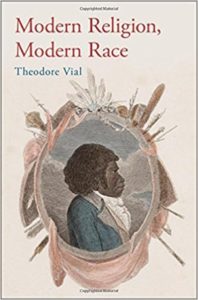 Understanding Their Connection
Understanding Their Connection
Theodore Vial calls religion and race “conjoined twins” in the first line of Modern Religion, Modern Race, in an immediate acknowledgement of the fact that religion is a racialized category, even when race is not explicitly mentioned. In this book, Vial argues that because the categories of religion and race are rooted in the post-Enlightenment project of reimagining what it means to be human, we cannot simply will ourselves to stop using them. Instead, we must examine these concepts critically, and be fully conscious of the ways in which religion always carries with it dangerous ideas of race.
By examining the theories of Kant, Herder, and Schleiermacher, among others, Vial describes how race and religion became building blocks of the modern world, and shows that while we disdain the racist language of some of the founders of religious studies, the continued influence of the modern worldview they helped create leads us, often unwittingly, to reiterate many of the same distinctions and hierarchies. Although it may not be time to abandon the very category of religion, with all its attendant baggage, only by acknowledging that religion is already racialized can we begin to understand how the two concepts are intertwined and how they operate in our modern world.
Reviews and endorsements of the publication include:
“[I]n Modern Religion, Modern Race Vial makes a very important contribution to debates on how the study of religion needs to explore its past, and in particular the often ignored overlap between categories of race and religion. For those interested in seeing how white male Enlightenment thinkers helped to create such a mess, this book needs to be read and taught widely.” — Malory Nye, Reading Religion
“Theodore Vial has given us a wonderfully learned and rich treatment of race and religion in the German Idealist tradition. Long established as one of the leading Schleiermacher scholars in the English speaking world, Vial has done us an enormous service in this text. It not only brilliantly explains the thought of Schleiermacher, Herder, and Kant on race and religion, but he also gives us a beautiful genealogy that brings us to our present moment. His work complements and expands the seminal work of Emmanuel Chukwudi Eze and helps us see the racial architecture of modern religious studies. Yet what also commends this book is the clarity and precision with which Ted Vial writes. Generations of students will sing his praises for giving them a text that they will understand and remember.”—Willie James Jennings, Associate Professor of Systematic Theology and Africana Studies, Yale University
For more information on the publication, click here.
Fellow travelers are scholars, activists, and practitioners that embody the ideals and commitments of the Project on Lived Theology. We admire their work and are grateful to be walking alongside them in the development and dissemination of Lived Theology.
